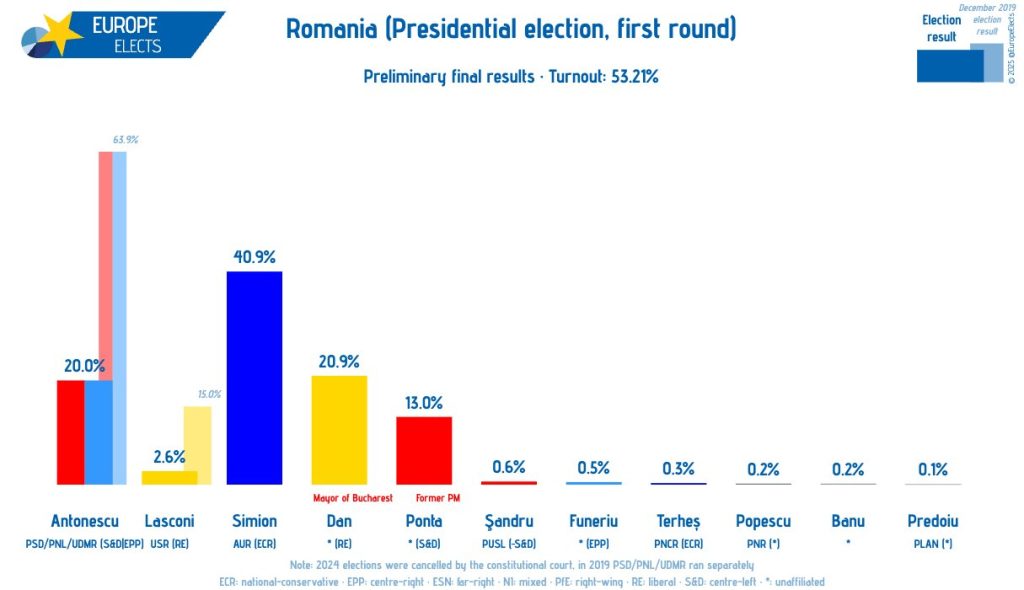Far-right Simion wins first round of Romania’s presidential rerun, to face Bucharest mayor in runoff vote
Reading Time: 4 minutesFar-right leader George Simion surged to a clear lead in the first round of Romania’s presidential election rerun, taking 40.9% of the vote ahead of the 18 May runoff that could reshape the country’s entire political trajectory.
Simion, leader of the ultranationalist Alliance for the Union of Romanians (AUR), will face centrist Bucharest mayor Nicusor Dan, who narrowly secured second place with 20.9%, just ahead of veteran liberal Crin Antonescu on 20%. The result has upended the country’s political establishment, with Dan narrowly advancing to the runoff against Simion.
The result signals a collapse in support for mainstream parties and exposes deepening voter frustration with Romania’s political class, as turnout slumped and extremist rhetoric gained ground ahead of the decisive second round in a fortnight.
Turnout was 53.21%, with a record 1mn votes from abroad. Support for Simion was high among Romania’s overseas electorate. Diaspora voters in Russia, Serbia, Spain and Italy backed him strongly, while Dan fared better in the US, China and Australia.

Georgescu could return to centre stage
The results confirm Simion’s dominance in a race shaped by political turmoil, foreign interference allegations and deepening polarisation. USR candidate Elena Lasconi, who downplayed evidence of Russian influence in Romanian politics, was eliminated from the race after receiving just 2.6% of the vote. This was a sharp drop from the 15% she secured in the annulled 2024 election.
The initial 2024 election was voided after intelligence services reported evidence of Russian interference in support of then-candidate Calin Georgescu, a former UN official with far-right views. Romania’s constitutional court nullified the result, leading to months of protests and legal battles.
Georgescu was barred from running again but endorsed Simion, who pledged to bring him into a future government. That alliance has sparked concern amongst EU officials, who are monitoring the potential rollback of Romania’s pro-Western orientation.
Antonescu endorsement could prove decisive
Simion, 38, campaigned on a hard-right, nationalist platform that included opposition to aid for Ukraine, a rejection of deeper EU integration, and frequent references to his admiration for US President Donald Trump. His message resonated in rural and economically depressed regions, where distrust of political elites and anger over inflation remain high.
In a fiery victory speech Sunday night, Simion declared the first-round result “a national awakening” and promised to restore “sovereignty and dignity” to the Romanian people.
Dan, an independent centrist with support from urban middle-class voters and pro-European liberals, now faces the task of consolidating opposition support ahead of the runoff. Antonescu has not yet endorsed either candidate, but his base is likely to prove decisive.
Simion boasts of ‘direct line’ to White House
Romania’s new presidential prospect has often been seen sporting a red Make America Great Again MAGA baseball cap and boasted about his direct line to Washington DC. A conservative Christian, Simion supported a failed 2018 referendum to change Romania’s constitution to prevent same-sex marriage.
Simion founded the AUR party in 2019 as a fringe anti-vaccination group during the Covid pandemic. In the years since, it has grown into Romania’s second-largest party, appealing to the working-class diaspora and young voters, and building on popular anger with mainstream politics.
Cyber attacks threaten electoral process
Several Romanian government and electoral commission websites were targeted by cyberattacks on election weekend, in what national security officials described as a coordinated campaign by Russian-affiliated hacker groups. Though the attacks were reportedly neutralised before disrupting the vote count, they triggered widespread concern about the resilience of Romania’s cybersecurity infrastructure, especially as the previous election was annulled due to foreign interference.
The attacks focused on front-end services, such as information portals and local authority platforms, designed to disseminate polling data and electoral procedures. Romanian cybersecurity agency DNSC said the volume and signature of the intrusion attempts resembled previous Kremlin-linked operations seen elsewhere in CEE. No breaches of back-end vote tallying systems were reported.
While authorities stressed that the rerun result remained legitimate, the incidents have renewed calls in Bucharest and Brussels for enhanced hybrid defence strategies, as Romania remains a frontline state in the EU–Russia information conflict.
Watershed ahead for Romania
Analysts say a Simion victory would mark a sharp break from the post-1989 consensus that Romania’s future lies firmly within the EU and NATO. Some fear that Simion’s rhetoric and alliances could steer the country closer to the illiberal playbook seen in Hungary and Slovakia.
“The 18 May runoff will be one of the most consequential moments in Romania’s democratic history since the fall of communism,” one political scientist told local media. “It’s a vote not just about personalities, but about Romania’s future geopolitical orientation.”
Simion’s rise has already rattled markets and diplomats. EU officials have warned of the risk of democratic backsliding and a potential veto-prone partner emerging within the bloc. Meanwhile, NATO observers have expressed unease over Simion’s scepticism toward military cooperation and his soft stance on Russia.
The final two weeks of campaigning are expected to be tense, with civil society groups and opposition parties urging high turnout to block what they see as the radicalisation of Romania’s politics.
Economic woes
Romania heads to the runoff under mounting economic pressure. The country is currently grappling with the EU’s highest budget deficit, recently revised to 6.7% of GDP, and faces a negative outlook from ratings agencies over fiscal slippage and slow structural reforms.
Investors and EU policymakers warned that further political instability, particularly under a Simion presidency, could spook markets and delay Romania’s access to EUR 29bn in EU Recovery and Resilience funds.
Simion’s economic platform remains vague, but his nationalist rhetoric and promises to review foreign-backed infrastructure projects have unsettled analysts and diplomats alike. The National Bank of Romania has kept rates on hold, citing inflation moderation, but its latest statement flagged “elevated policy uncertainty” and fiscal risks as key threats to stability.

